Eastern Europe
Transgender journalist who enlisted in Ukrainian military returns to D.C.
Sarah Ashton-Cirillo wounded on battlefield in February
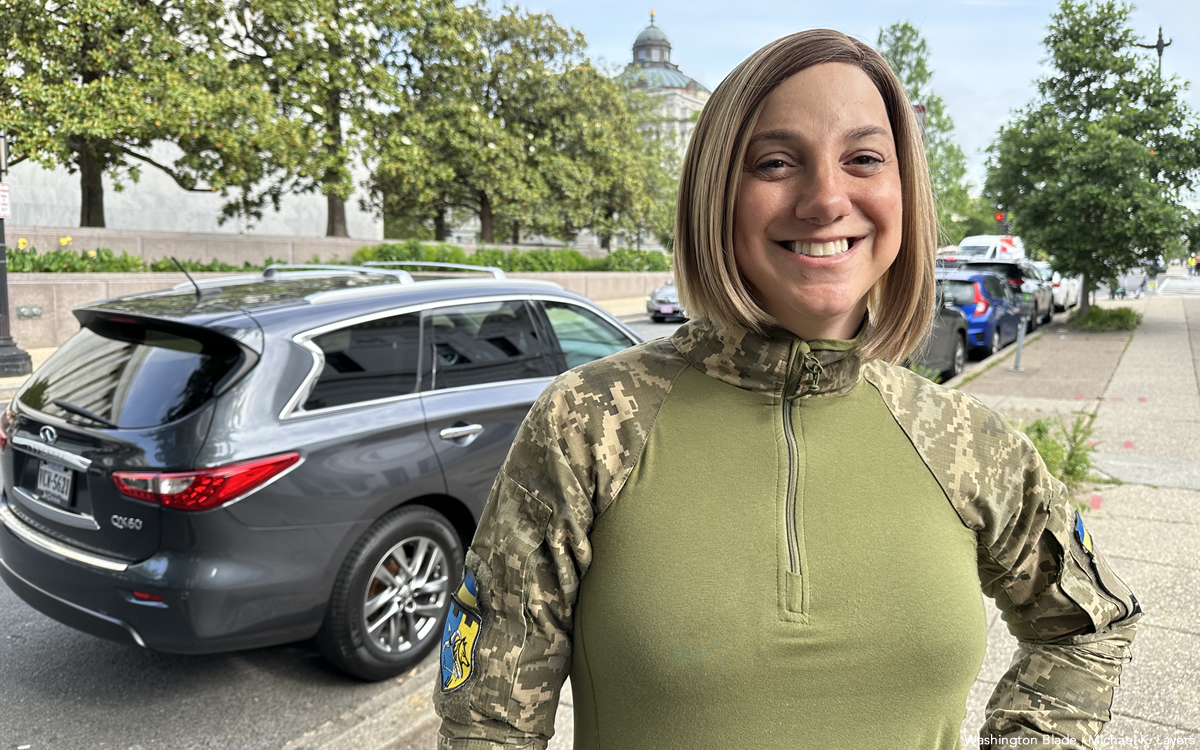
Sarah Ashton-Cirillo was a journalist when she began to cover the Armed Forces of Ukraine’s Kharkiv Defense Forces at the beginning of Russia’s war against the country. She eventually enlisted, and a commander from the Ukrainian Defense Ministry on Jan. 31 facilitated her transfer to the unit’s 209th Batallion of the 113th Brigade.
Ashton-Cirillo, a transgender woman who was born in New York, was working as a senior combat medic in a trench near Kreminna, a Russian-occupied city in eastern Ukraine, on Feb. 23 when shrapnel from an enemy artillery shell wounded her. Ashton-Cirillo suffered injuries to her right hand and to her face, and her fellow soldiers had to wait seven hours to evacuate her. Ashton-Cirillo eventually received treatment for her injuries in Kharkiv, Ukraine’s second-largest city that is roughly 130 miles northwest of Kreminna.
“The big key there was I wasn’t able to take any painkiller by staying in the trench because I was still technically in battle,” she recalled to the Washington Blade on May 19 during an interview that took place at a coffee shop near the U.S. Capitol.
Ashton-Cirillo noted her unit won the battle during which she had been wounded.
“Seven hours after my injury, I finally got to a hospital,” she said. “By that point I hadn’t taken any antibiotics (because) we didn’t have any antibiotics and infection had set in. They took me to a hospital in Kharkiv and they had to clean the wound. They had to wait to make certain that it was healing before they could do surgery.”
“I was living with this open wound for eight days,” added Ashton-Cirillo, who was in uniform when she spoke with the Blade. “They were able to close my face up on the second day.”
Two small scars on her face are visible. She said she has limited mobility in her right hand, and has no feeling from her wrist to her fingers.
“For the most part, I’m so blessed and very lucky,” said Ashton-Cirillo.
Ashton-Cirillo now a junior sergeant
The Blade first spoke with Ashton-Cirillo last December while she was in D.C. to speak with lawmakers on behalf of the Ukrainian Defense Ministry about the Armed Forces of Ukraine’s medical needs.
Ukrainian President Volodymyr Zelenskyy met with President Joe Biden and spoke to a joint session of Congress less than three weeks after the interview.
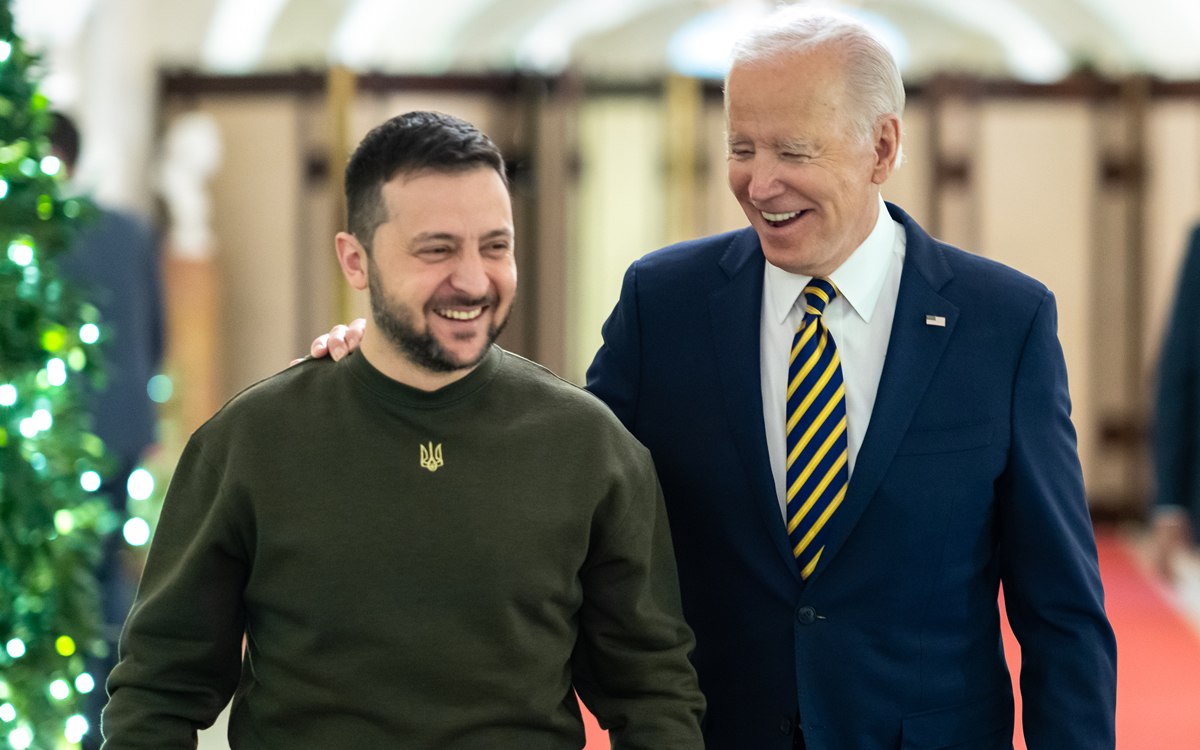
Ashton-Cirillo early last month became a junior sergeant. She returned to D.C. on May 15.
Ashton-Cirillo met with U.S. Reps. Eric Swalwell (D-Calif.), Mike Quigley (D-Ill.) and Steven Horsford (D-Nev.) and aides for U.S. Rep. Michael McCaul (R-Texas) and U.S. Sens. Marco Rubio (R-Fla.) and Jacky Rosen (D-Nev.) before she left the nation’s capital on May 19. Ashton-Cirillo also spoke to journalists from the Global South at the National Press Club and met with José Andrés, whose World Central Kitchen continues to operate in Ukraine, and Amnesty International representatives.
“We had some successes on my trip in December,” she said. “Members of Congress … in the House and Senate were interested in my experiences regarding my service.”
Ashton-Cirillo specifically praised Andrés for his work in Ukraine.
“There is nobody that’s done more for our cause,” said Ashton-Cirillo. “Nobody has done more to save the Ukrainian people as a foreign civilian than World Central Kitchen and Chef José Andrés.”
No timeframe for spring offensive
Ashton-Cirillo sat down with the Blade two days before Zelenskyy met with Biden and other world leaders at the G7 summit in Japan. (Biden met with Zelenskyy in Kyiv, the Ukrainian capital, on Feb. 20.)
Ukrainian officials this week denied Russia’s claims that it had captured Bakhmut, a city in Donetsk Oblast. (Ashton-Cirillo last December told the Blade she had previously worked to counter Russian propaganda that claimed Russian troops had captured the city.) The Associated Press reported a group of anti-Kremlin Russian partisans — the Russian government described them as Ukrainian “military sabeteurs” — attacked an area near Belgorod, a Russian city that is roughly 25 miles from the country’s border with Ukraine.
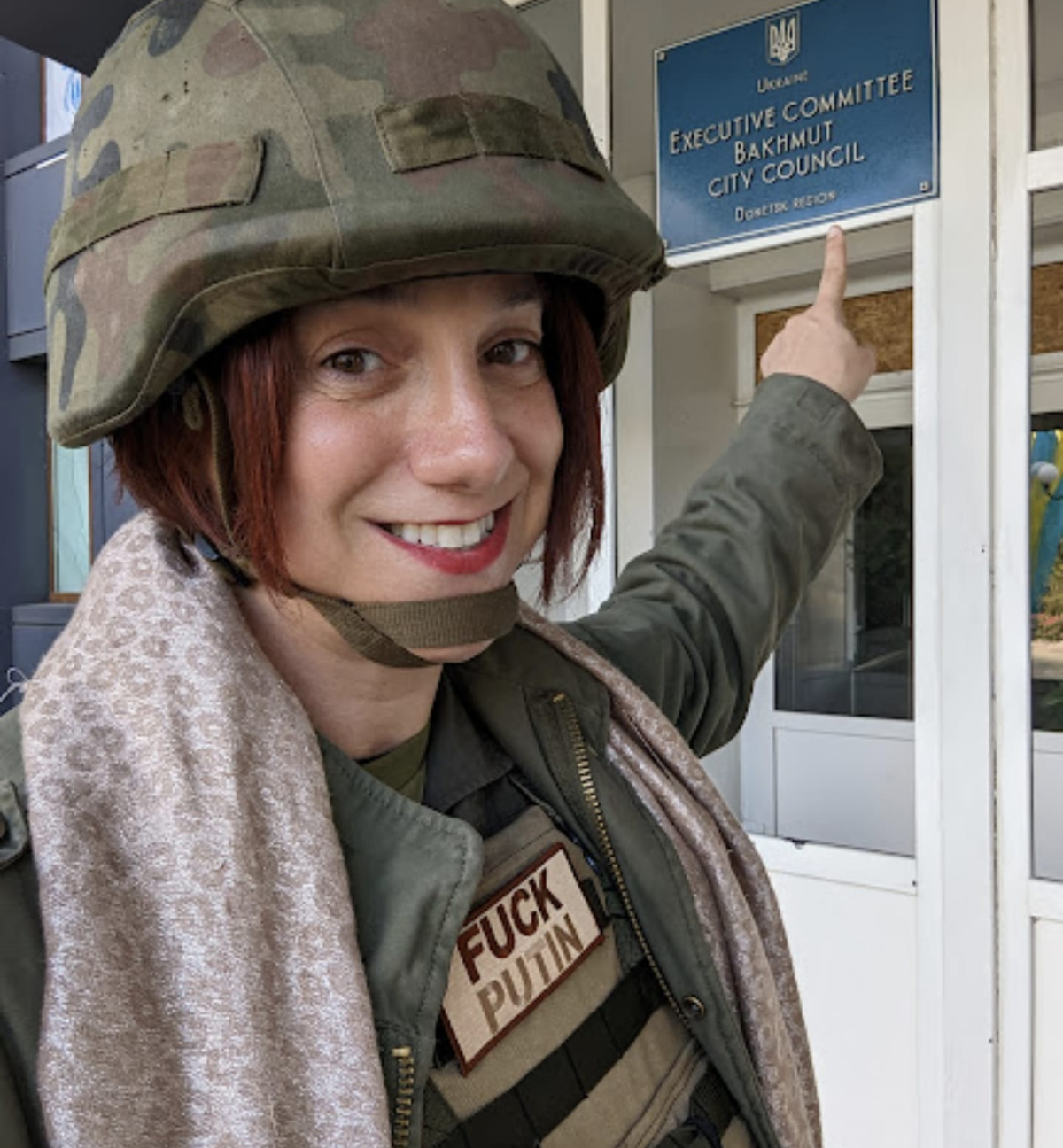
The International Criminal Court in March issued arrest warrants for Russian President Vladimir Putin and Russian Children’s Rights Commissioner Maria Lvova-Belova over the abduction of children from Ukraine. Zelenskyy earlier this month visited the ICC while he was in the Netherlands.
Ukraine continues to ask the U.S. and other countries for more weapons as it prepares to launch its long anticipated “spring” offensive.
Patriot missiles on May 16 shot down 29 of the 30 missiles that Russia launched at Kyiv. Ashton-Cirillo said Ukraine specifically needs DPICMs (dual-purpose improved conventional munition), a type of smart munition, “so we can soften up the Russian trench lines.”
“I know what these trenches are,” she said. “They are going to be absolutely fortified as we attempt our counter attacks and any potential counter offensive.”
Ashton-Cirillo said she does not have a “timeframe” for when the offensive to begin.
“We want all the weapons we can get now before launching,” she said. “We will beat the Russians under any circumstances and we are we have the history to prove it.”
“We’re trying to make certain that we’re not losing unnecessary Ukrainian lives,” added Ashton-Cirillo. “We’re not wasting U.S. taxpayer dollars and the best way to do that is have an efficient, effective attack method, and that’s why we need some of these more technologically advanced weapons. We can fight with RPGs and our assault rifles, and we’ll win, but at high cost, high cost to us, high cost to the American taxpayer. We understand as stewards of the Americans’ trust that we have to do everything in a proper way to bring victory as soon as possible.”
Gender identity ‘less of a spectacle among the international press’
Zelenskyy last summer said he supports a civil partnerships law for same-sex couples. Ukrainian lawmakers later approved a media regulation bill that will ban hate speech and incitement based on sexual orientation and gender identity.
Zelenskyy, a former actor and comedian, in made a broad reference to LGBTQ and intersex rights in a virtual appearance at this year’s Golden Globes. Ukrainian Ambassador to the U.S. Oksana Markarova during a Jan. 26 event in D.C. that highlighted Ukrainian LGBTQ servicemembers applauded Kyiv Pride and other LGBTQ and intersex rights groups in her country.
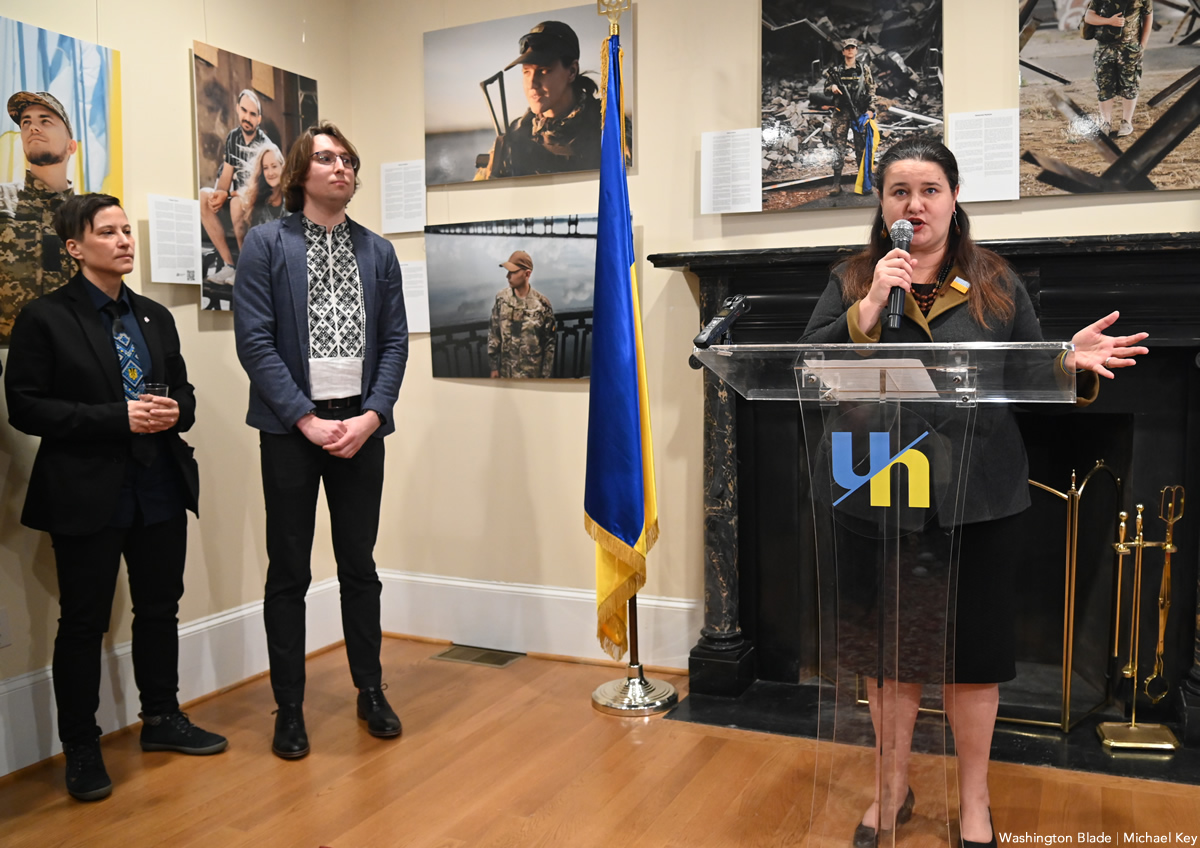
Ashton-Cirillo pointed out the Ukrainian military is creating a group that will work directly with journalists in the country and from around the world. She said the initiative’s goals are “to guarantee free speech during war time, to guarantee a clear message based on truth and facts from the journalist standpoint during wartime and also to ensure that we have free speech, and free thought among the press post victory in Ukraine.” Ashton-Cirillo also told the Blade that her gender identity is “becoming less of a spectacle among the international press, and that’s important to me, too, as well.”
“There’s no denying I’m trans. I don’t hide it,” she said. “I’m very proud to be a member of the LGBT community. My work and my focus is on this war, this liberation for Ukrainians and liberty for everyone who cares about freedom, and that includes trans people. That includes Crimean Tatars, that includes any immigrants from the Global South that live in Ukraine.”
“This victory will help strengthen the LGBT community around the world because there’s going to be one less country that will be able to persecute Ukrainians, LGBTQ members,” added Ashton-Cirillo. “We are going to inflict a transformative defeat upon the Russian invaders such that Russia themselves will have to look inward as to the mistakes they’ve made with human rights … and understand the price that they’re paying is very high for things like taking (Wall Street Journal reporter) Evan Gershkovich hostage.”
She also said she and her comrades “understand the cascading effect of a Ukrainian a clear transformative Ukrainian victory over Russia will have for human rights around the globe.”
Eastern Europe
LGBTQ Ukrainians bear brunt of psychological toll amid ongoing war
Saturday marks two years since Russia invaded country
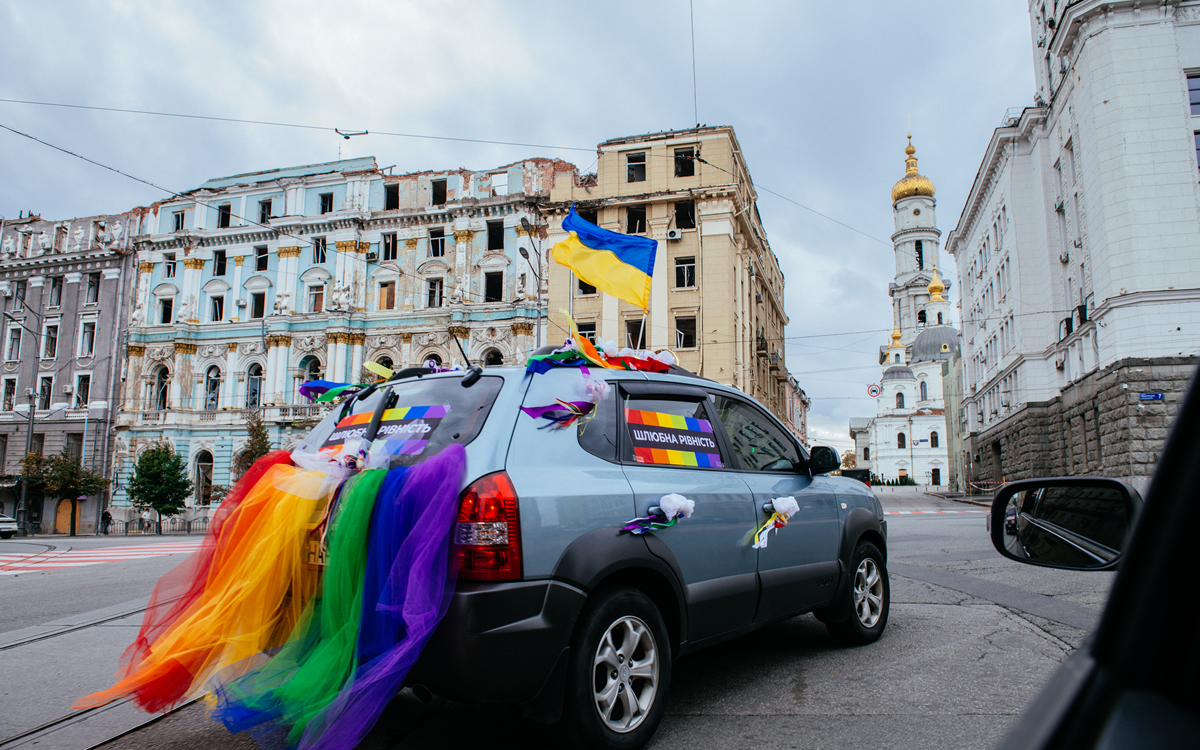
As Ukraine weathers Russian missile attacks and endures a harsh winter, the psychological consequences on its LGBTQ community are emerging as a distressing and often overlooked aspect of the conflict.
Recent reports from Human Rights First, based on their visits to the northeastern Ukrainian region of Kharkiv, shed light on the profound emotional impact experienced by LGBTQ individuals amid the sustained Russian aggression.
Saturday marks two years since Russia’s full-scale invasion of Ukraine began. Throughout this time, Human Rights First has sought to bring human rights into the heart of the discussion surrounding the conflict, offering support to human rights defenders, activist organizations, and individuals profoundly affected by the war.
Human Rights First last November initially surveyed Kharkiv to understand how communities were preparing for the harsh winter. Returning last month they found the LGBTQ community faced not only the physical challenges of extreme temperatures but also the hidden harm of severe psychological distress.
Human rights defenders on the forefront were documenting war crimes and supporting marginalized communities, including LGBTQ individuals. They emphasized the critical need for specialized psychological support within this community.
Vasyl Malikov, a key figure in Kharkiv-based LGBTQ NGOs Alliance.Global and Spectrum Women’s Association in Kharkiv, spoke about the increasing requests for psychological assistance and counseling.
Malikov highlighted the urgent need for both psychologists and a more comprehensive education about mental health and trauma issues.
“Some counseling can be done online, and it’s better than nothing, but what’s really needed is face-to-face time with a psychologist. Of course, that’s resource-intensive,” Malikov said, underscoring the unique challenges faced by the LGBTQ community.
Associate Professor Taras Zhvaniia, collaborating with Alliance.Global, shared insights into the growing demand for psychological support within the LGBTQ community. Initially addressing trauma in children, the scope expanded to include adults grappling with anxiety, depression and other emotional challenges related to the ongoing conflict.
Zhvaniia detailed the psychological struggles unique to the LGBTQ community, ranging from anxiety and panic attacks to specific fears such as reluctance to sleep in beds at home, avoiding bomb shelters and apprehension about routine activities during shelling.
Efforts to increase psychological knowledge for the general population are underway, yet the escalating demand for LGBTQ-focused support outpaces available resources. Human rights defenders have proposed measures, including funding for online counseling and visits by foreign psychologists, specifically tailored to address the psychological impact on the LGBTQ community.
The silent struggle faced by the LGBTQ community in Kharkiv and beyond necessitates international attention, according to Human Rights First. The organization added the lack of adequately trained psychologists raises concerns about the unaddressed psychological impact, underscoring the urgency for U.S. officials and the international community to comprehend and respond to the unique challenges faced by LGBTQ individuals in the midst of the ongoing conflict.
Eastern Europe
LGBTQ community in Kharkiv braces for another winter at war
Ukrainian city is 30 miles from Russian border
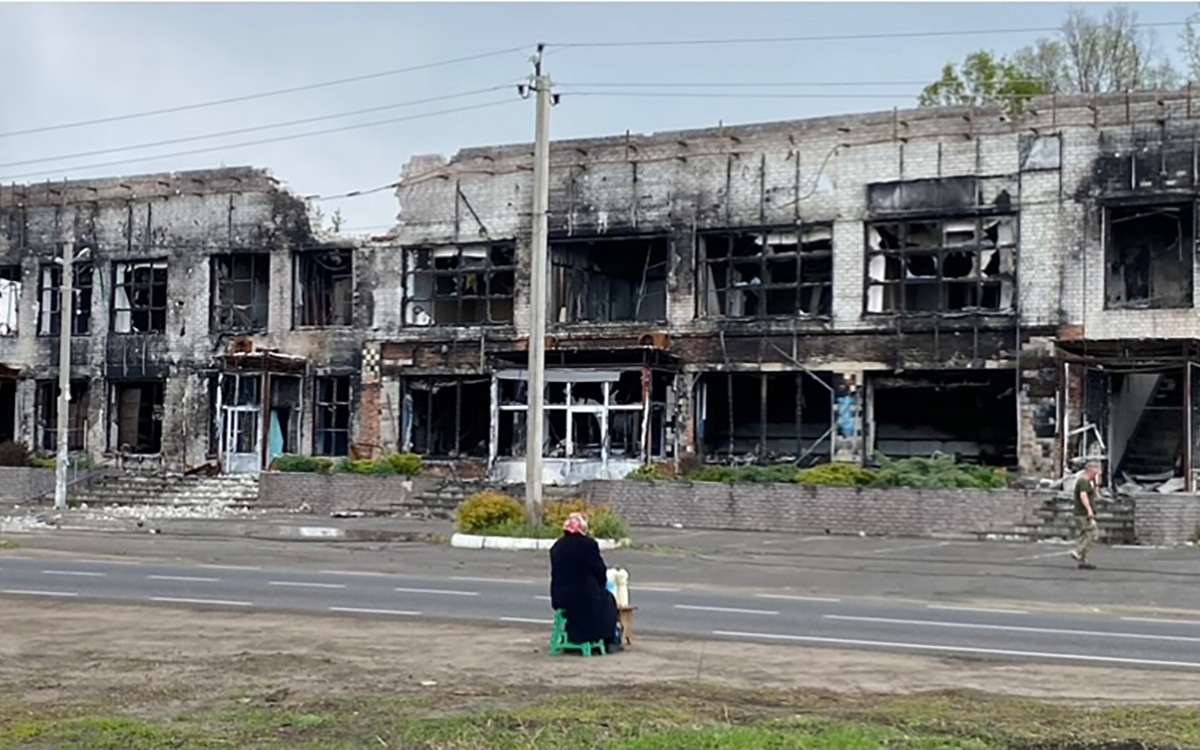
KHARKIV, Ukraine — Only 30 miles from the Russian border, Kharkiv is Ukraine’s second biggest city and was a key target of Russia’s invasion in February last year, when it was almost encircled.
I have been reporting regularly from Kharkiv since last year’s full-scale invasion, and the city is still often bombed by Russian missiles. United States government officials rarely come here because of the security situation. As temperatures plummet, Russia is targeting Ukraine’s heating infrastructure.
It hopes to make life unbearable for people in Ukraine’s cities and force another wave of mass movement out of Ukraine and into Poland and other European countries.
Attacks on Ukraine’s energy grid have begun, and some communities in the city have been particularly vulnerable since Russia’s invasion last year, and are facing a difficult winter.
Vasyl Malikov of the Kharkiv-based LGBTQI NGOs Alliance.Global and Spectrum Kharkiv has been distributing packages of hygiene goods, food and vouchers for humanitarian aid since last year. He helped to set up a new shelter for LGBTQI people and their relatives in the city.
“There are government shelters, and the authorities say they don’t discriminate against who uses them, but we know from lived experience that these official shelters aren’t always welcoming places for LGBTQI people. They feel vulnerable and are harassed there,” Malikov said. “We thought about setting up a shelter last year, but the situation seemed too uncertain and it wasn’t that easy to find premises, but we have gone ahead now and we can offer accommodation for up to 16 people to stay for up to three months.”
Some of those in the shelter are fleeing areas of conflict on the front lines, others have fled domestic violence, and others have been driven away by families who refuse to accept them. Some people, in Kharkiv for medical appointments, stay for days, others stay for weeks or months.
The shelter is a large apartment that has a kitchen and a large room where workshops and social events are held. It is on a block near a metro station which, Malikov says, is a useful place to run to in case of heavy bombardments.
Crucially, a new generator has arrived, which should heat the shelter during power outages. It’s a dual fuel model that can run on diesel or gas and costs around $2,000.
“This is a safe place for LGBTQI people and their families,” explains Malikov. “We shouldn’t have to set up our own facilities, the authorities should be doing this work, but we have to because they don’t.”
Other NGOs are also filling gaps that local authorities are failing to provide. The NGO Sphere has, since 2006 “been uniting women of Kharkiv, including lesbian and bisexual women.”
Tucked in a small office near the city center, some of Sphere’s activists described how their work has adapted to meet the challenges of the war.
“We’ve been providing aid for those forced to flee their homes because of the war,” says Yevheniia Ilinska, a long-standing member of the organization. “We’ve raised money from abroad — including from LGBTQ+ groups — to distribute basic supplies. We’ve been handing out clothes, including socks, and have provided some to our military.”
Sphere’s activists say that beyond its obvious damage and destruction to the city, the war is causing “a social revolution:” many men are away from their homes fighting in the military, and many family dynamics are changing dramatically.
The activists fear a spike in domestic violence when soldiers return home, a phenomenon witnessed in other countries.
“The full-scale war significantly aggravates some of the problems that existed before, including gender-based domestic and sexual violence, and discrimination at work,” Sphere notes on its website.
The war has also helped change some attitudes towards LGBTQ+ people in Ukraine. Last September, when the dangers from rocket attacks made an open-air parade impossible, Sphere helped organize a successful Pride event in the city’s metro system.
“We dressed wearing national symbols and LGBT flags,” says Ilinska. “And the public reception was very positive.”
The reaction is more evidence of a positive shift since last year’s invasion in public attitudes towards LGBTQ+ people, in part because the community’s contribution to the war effort is increasingly seen and valued. Hopes are high that Ukraine will soon legalize same-sex civic partnerships, and eventually same-sex marriages.
But for now, the cold is an immediate challenge. Sphere is raising funds to offer locals a safe place so that “in the event of rocket attacks and power outages, LGBTQ+ people will be able to stay warm indoors, have a hot drink, take a shower, and do laundry,” says Ilinska.
“We’re constantly adapting our work,” says Ilinska. “Adapting our advocacy and our public events, and our projects on targeting humanitarian aid. Kharkiv is changing and so are we, we have to react to this dramatic crisis, to the invasion, and we’re proving that we and our community can resist,” she said.
For more, see Human Rights First’s new report, Ukraine’s Winter War, written by Maya Fernandez-Powell and myself.
Eastern Europe
Transgender soldier from US named Ukrainian military spokesperson
Sarah Ashton-Cirillo was journalist before she enlisted

The Armed Forces of Ukraine have named a transgender soldier from the U.S. as one of its English-speaking spokespeople.
The Kyiv Post, an English-language newspaper, last week in a tweet noted Sarah Ashton-Cirillo “has become one of the speakers for the Defense Forces.” Deputy Defense Minister Hanna Malyar is among those who praised Ashton-Cirillo.
“Sara informs the English-speaking audience — she objectively covers the events of the Russian-Ukrainian war, debunks Russian fakes and propaganda,” said Malyar, according to the Kyiv Post. “Sarah’s audience reach on Twitter alone was 28.3 million users. So, the enemies get excited on hateful social networks, of course. However, this has only increased Sarah’s audience.”
Ashton-Cirillo was a journalist when she began to cover the Armed Forces of Ukraine’s Kharkiv Defense Forces at the beginning of Russia’s war against the country in 2022. She eventually enlisted, and a commander from the Defense Ministry on Jan. 31, 2023, facilitated her transfer to the unit’s 209th Batallion of the 113th Brigade.
Ashton-Cirillo, who was born in New York, was working as a senior combat medic in a trench near Kreminna in eastern Ukraine on Feb. 23, 2023, when shrapnel from an enemy artillery shell wounded her. Ashton-Cirillo suffered injuries to her right hand and to her face, and her fellow soldiers had to wait seven hours to evacuate her. Ashton-Cirillo eventually received treatment for her injuries in Kharkiv, Ukraine’s second-largest city that is roughly 130 miles northwest of Kreminna.
The Washington Blade spoke with Ashton-Cirillo in May while she was in D.C.
“The big key there was I wasn’t able to take any painkiller by staying in the trench because I was still technically in battle,” she recalled. “Seven hours after my injury, I finally got to a hospital.”
Ashton-Cirillo on Tuesday told the Blade her “new role within the Armed Forces of Ukraine is a position that has been earned due to my performance on the physical and informational battlefields.”
“What this means is that in today’s Ukraine being a part of the LGBTQ community is neither a benefit nor hindrance, but simply an accepted part of whom a person is,” she said. “The vocal support shown by LGBTQ groups in Ukraine, such as Gender Stream, Kyiv Pride and Ukraine Pride, upon news of this taking place, along with the statement of confidence in me issued by the Ukrainian Ministry of Defense and Deputy Defense Minister Hanna Maliar, made me understand that this battle for the country’s liberation is not about tolerance or acceptance for any one group but freedom and liberty for all Ukrainians.”
-

 U.S. Supreme Court3 days ago
U.S. Supreme Court3 days agoSupreme Court to consider bans on trans athletes in school sports
-

 Out & About3 days ago
Out & About3 days agoCelebrate the Fourth of July the gay way!
-

 Virginia3 days ago
Virginia3 days agoVa. court allows conversion therapy despite law banning it
-

 Maryland5 days ago
Maryland5 days agoLGBTQ suicide prevention hotline option is going away. Here’s where else to go in Md.












